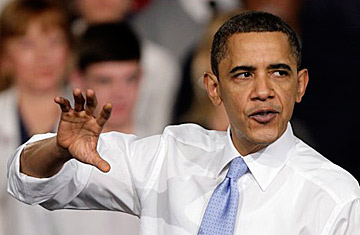
President Obama speaks on health care reform in Strongsville, Ohio, on March 15, 2010
Congressman Adam Smith's phones rang so much on Monday that one of his aides called it a "siege." Almost all the calls were about health care, and most of his constituents' opinions were the same. "In my case, it's very one-sided," says Smith, a Washington State Democrat. "It's all been on the anti side."
The reason for the calls is no secret. National business groups have blanketed Tacoma television stations with a 30-sec. spot that features depressing images of discouraged workers and a voice-over warning that health care reform will bring billions in new taxes, mandates on businesses and higher health care costs. At the end, Smith's phone number flashes across the screen. "It's a pretty thorough buy," Smith admits, saying it has sometimes run three or four times on a single station in an hour.
The deluge is not limited to Smith's district. Across the country, groups on all sides of the health care reform debate have been targeting swing members of Congress with costly ad campaigns. Over the coming week, as the House gears up to take a final, deciding vote on reform, issue-ad spending by corporations, trade groups, unions and advocacy organizations may top $24 million, adding to the estimated $200 million that has already been spent on health care advocacy ads. "We are going to be at parity with the other guys in spending for the week," said a pro-reform organizer who had been monitoring the antireform ad purchases. "I think our side will spend $12 million for the week."
The ad running in Smith's district, which was paid for by an offshoot of the U.S. Chamber of Commerce, is part of a 17-state campaign slated to cost between $4 million and $10 million. Another conservative group, the American Future Fund, is running ads in 18 House districts that compares health care reform to a pig wearing lipstick before flashing a phone number. America's Health Insurance Plans, the industry trade group, has its own television campaign. Another secretive group called the League of American Voters, which works with former Bill Clinton adviser Dick Morris, is running additional ads targeting Democrats who may support "[President] Obama and [House Speaker] Pelosi's health care takeover."
On the pro-reform side, a coalition of labor and progressive groups, Health Care for America Now, plans to launch a $1.3 million ad buy on Tuesday, which will include ads in at least 12 districts. Americans for Stable and Quality Care (ASQC), which is funded largely by the pharmaceutical industry, will run ads in as many as 44 House districts, according to an internal document. "Is it perfect? No. But it's the biggest advance in 45 years," runs the script of one ASQC ad. "Congress, the time is now to pass health reform."
A group called Americans United for Change has been running spots in as many as 17 districts, targeting African-American voters with a pro-reform message. Doctors for America, a pro-Obama group of physicians, is also expected to advertise, while MoveOn.org has gone up with a six-figure national cable-television buy that compares health care reform to the struggle for civil rights. "Now is the time for historic action," the ad proclaims.
Most of these advertisements come with little or no disclosure about what specific companies, unions or individuals are providing the funds. Thanks to the recent controversial Supreme Court campaign-finance decision on Citizens United v. Federal Election Commission, the ads also offer premonitions of what many of these same members of Congress may face in the fall, when unions and corporations will be able to spend money anonymously to advocate for candidates' election or defeat in the weeks before the polls.
White House aides, who are critical of the Supreme Court decision, say they worry that the recent change to election law could lead to whole new level of campaign-finance pressure. "The most alarming part of Citizens United is that theoretically insurance companies could go to members and say, 'Oppose health reform, or I am going to run a million-dollar ad campaign in your district,' " says Dan Pfeiffer, the White House communications director. "That's the nightmare scenario."
For his part, Smith says he is trying to put the barrage of industry-funded ads and the phone calls in perspective. "Their opinions are very valid," he says. But the ads are unlikely to make a difference in his vote. Having previously voted for the House version of the bill, Smith says he will wait to see the final language before making a decision. "I am leaning strongly in favor of the Senate bill," he says. Such firm pronouncements, however, are unlikely to stop the phone from ringing.
